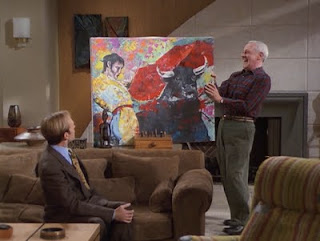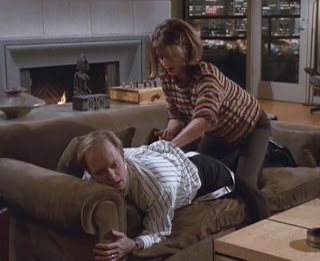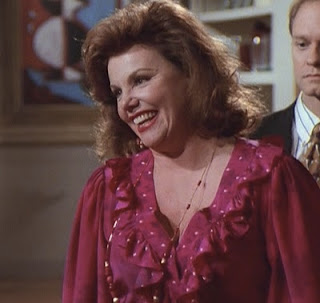Tuesday, September 27, 2011
Frasierquest 4.10: Liar! Liar!
John Rajeski: How is Niles, anyway?
Frasier: Ah, he's, ah- he's abroad now.
John: Really? Woah, that musta hurt.
Are the SeaBees over already? Man, I didn't even get to make my predictions. This year the awards are disposed with off-screen as a starter for a less glamorous story about Frasier confronting an element of his past. "Liar! Liar!" is kind of odd. The episode focuses on something that Frasier did wrong years ago, and is unable to really fix, but he does his best. The structure is weird and we end in a way that's barely foreshadowed by the rest of the story, but it ends up being pretty funny so it's easy to let go. And Niles and Daphne's relationship takes an interesting turn.
After a defeat at the Seabees, Roz calls her grandma from Frasier's apartment to tell her she won. This prompts a debate among those present about whether it's ever acceptable to lie, and during the course of the conversation, Frasier and Niles reveal that they got out of their physical fitness exam at school by pulling a fire alarm and blaming it on the local bully, John Rajeski (Saul Stein). Martin is upset with them, since the bully ended up getting expelled, and Frasier decides to find out where John ended up and maybe come clean. He finds John in prison for passing a bad check, and John can, with some assistance, trace his life of crime back to being kicked out of Frasier's prep school. Rather than let John know what happened then, Frasier tries to help him indirectly, going to his wife (Carlene Watkins) to work on their marital problems. Her problems revolve around wanting a more exciting and dangerous sex life, and since her husband has been released and is on his way home, she's got plans for the doc.
The episode sets up its major premise explicitly; is lying ever acceptable? On the one hand, the lie that we follow through the story is clearly a bad one- it set a young man on a life of crime and all to get out of exercise. On the other hand, Frasier quickly decides that just telling John the truth won't solve anything (especially since John has a way of messing guys up.) When John's wife comes on to him, he ultimately has to hide in their apartment to get out with his limbs intact. Once again he has to weasel out of things rather than confront them head-on, so he's not entirely unsold on the "lying" bit.
Niles gets caught up in the lying business too, sort of. When he actually throws his back out, he happily accepts Daphne's offer of a lotion rubdown, only to discover it's the kind of lotion that goes on cold and turns into a raging inferno. So he tries to pretend it worked in order to avoid a second coat. It's an unusual twist on their normal shenanigans, and it ties into the episode's theme a bit, though "lying" is a broad category and applies to a lot of sitcom plots.
So the actual story for this ends up going all over the place, but there's a certain elegance in how it wraps up. Frasier does his best to try and get the couple to reconcile, and they sort of do, or at least reach a state of stable dysfunction. So in lieu of taking a strong moral stance on the lying issue, "Liar! Liar!" concludes that lies cause trouble but we do our best to muddle through. That's probably accurate.
No Guest Caller
Written by Chuck Ranberg & Anne Flett-Giordano
Directed by James Burrows
Aired January 14, 1997
Daphne: Just yesterday you reconciled that couple on the brink of divorce, and today, you helped Molly from Tacoma overcome her addiction to Swedes…
Frasier: That was sweets, not Swedes.
Daphne: I thought it was strange when you told her to limit herself to one or two after meals.
Friday, September 23, 2011
In Theaters: Drive
Drive is a unique experience, and because of that it may not hang around theaters for long. It's basically a crime thriller done in the style of a film from the eighties, with neon-letter titles and a score reminiscent of Tangerine Dream. But in its spare beauty, deliberate pace, and moments of merciless brutality, it's not something you can easily peg as a genre piece or style emulation. This may be why it's having a polarizing effect on audiences, and why the people distributing it can't quite work out how to sell it. Most of the time we want a clear idea of what kind of movie we're going to see and what we're to expect from it, but if you can take Drive on its own terms and let it establish itself, it's a rich and compelling thing.
Thursday, September 22, 2011
Why You Should Watch Community
Tonight at 8/7c is the third season premiere of NBC's highly underrated Community. The show has been a cult darling for most of its existence, though that hasn't translated into ratings or Emmys (seriously, nomination committee what is your problem.) This means I have the unenviable task of trying to get you to listen to why you should really give this a try, trust me, you'll love it, etc. Fan evangelizing is annoying, I know, and yes I'm going to get started on The Wire at some point, but the job of even an amateur blog critic is to call attention to these sorts of things, so hear me out.
Wednesday, September 21, 2011
Frasierquest 4.9: Dad Loves Sherry, The Boys Just Whine
Niles: I didn't know Mae West had children!
And now things really get interesting for Martin Crane. He got a girlfriend last season, but not one we saw very much of. It's a shame that Jane Kaczmarek never got a lot to do on the series, but the arrival of Marsha Mason as Sherry Dempsey is something of a big deal. She looms large in this and next season as a force in the lives of the characters, becoming sort of a marker for this particular part of the show's history. In retrospect it's remarkable that the character worked at all, let alone was a welcome presence for as long as she was.
Saturday, September 17, 2011
The Tabletop: Space 1889: Red Sands

I've long been in love with Space: 1889, the RPG that captured the spirit of Victorian science fiction long before anyone knew what "steampunk" was. The setting is one of my absolute favorites, thick with romance, mystery, wonder, and morally ambiguous colonialism. The system I'm not quite as devoted to (though I don't think it's bad), and while Heliograph Incorporated has been doing the Lord's work keeping the original game in print, Space: 1889: Red Sands, a setting book for Savage Worlds, has the promise of updating the classic world with a more modern, streamlined rules set. The two prove to be a good match, and while the book has a few shortcomings and doesn't quite capture all the things that made me love the original game, it's a good translation of the setting with some new elements that open up gameplay quite a lot.
The setting is based on the premise that Thomas Edison invented a form of space travel in 1870, with ether propellers taking ships to the planets of the inner solar system, which happened to be mostly inhabited. Earth's major colonial powers took advantage of the opportunity to expand their empires, setting up bases on the new worlds and making the Great Game of political intrigue even more complicated. While the original game limited PCs to human adventurers, and generally presumed they'd be loyal subjects of the British Empire (with options for anarchists and criminals), Red Sands gives us the opportunity to play noble or savage Martians and Venusian lizard men (no Selenites, though, but I'll get to that later.)
The thing tying all characters together is that they're all members of the British Association's Explorer's Society. It's a group dedicated to discovery, advancing knowledge, and also saving the civilized worlds from the predations of evil secret societies. This is where some of the new stuff comes in- a mysterious cult called the Brotherhood of Luxor has arisen, and while the Explorer's Society doesn't know a lot about it, they know they're up to no good.
The conflict between the Explorer's Society and Brotherhood of Luxor does two things. First, it sets up the Red Sands campaign, a serialized adventure taking up a chapter, which takes the players all over the inner planets fighting a sinister conspiracy. It also alleviates one element of the setting that people may have a problem with- nowadays we generally view old-school imperialism as a Bad Thing, what with our valuing self-determination and not treating other peoples as disadvantaged savages and so on. Frank Chadwick's original game showed some understanding of the messy complexities of the British Empire and Victorian values, but it was hard to really push against those things, and characters were locked in a "colonizer" role by default. Now the characters are not only not necessarily the colonizers, they're not necessarily fighting for the Empire or Queen Vic- they're united by a more palatable, more universal love of adventure and dislike of diabolical masterminds.
The campaign itself is fairly interesting, mirroring the serialized adventures in other Savage Worlds setting books. It has a darker, grittier tone than most of the published material for the original game, and it may be worth double checking the lethality of some elements, but it's a compelling story and likely won't require a GM to do any more tweaking than he or she wants to. There are also a number of shorter, self-contained "Savage Tales" plot hooks, and a nice random adventure generator system to spark ideas.
There's a good amount of setting information, though space concerns mean you may want to turn to some of Heliograph's reprints to pick up on details. However, there are problems I do have with Red Sands' presentation of the setting. As the name implies, the central campaign- and so much of the material- is very Mars-centric, and this is a problem the original game had in terms of the supplements it put out before the line was canceled. More on the lizard men and dinosaurs of Venus would have been welcome, and there's very little information on the moon; the insectoid Selenites aren't even statted up anywhere. Only one of the Savage Tales plots takes place on the moon, and that doesn't involve the Selenites, rather dealing with the vanished Vulcan culture. I had hoped at first that Pinnacle planned to deal more with the other worlds in future books, but I've not heard much on that front. So if you really want to explore all the Many Worlds you may have to do a few conversions yourself.
Though Space: 1889's original rules system was a little clunky and unfocused, I am glad that the Savage Worlds conversion preserves something of its funky, fiddly Invention system that lets you create everything from a more efficient ether propeller to a goddamn lightning cannon, as well as rules for building your own ether flyer (which any good group should do, in my humble opinion.) Converting characters over should be no problem, and of course Savage Worlds was designed for pulpy action-adventure so it fits the setting quite well.
I'm not entirely satisfied with the book, but this may be because I'm applying high standards to the treatment of one of my favorite settings ever. It's definitely focused a bit more on savage adventure than on the wonder of discovery, but the latter isn't shortchanged. I do think the emphasis on Mars represents a missed opportunity to correct the same imbalance in the original line, which was discontinued before it could begin to focus elsewhere. And I'm still nonplussed about the Selenites (they should be in the errata or something.) Still, I can't argue against this being a successful translation of the setting to a new system, and not only is the change in mechanics is for the better, but Red Sands opens up the setting and adds quite a few new possibilities for adventure. It's good enough that I want to see more.
Grade: B+
(Note: this review or something like it should be up on RPG.net later. Since this site gets less traffic I figure I'd give you a sneak preview.)
Saturday, September 10, 2011
Frasierquest 4.8: Our Father Whose Art Ain't Heaven

Frasier: Honestly, Niles, by calling her so many times you've given her all the power. You're much better off coming from a position of strength.
Niles: Don't pour that sherry on your shirt - it will stain.
Frasier: What?
Niles: Oh, I'm sorry. I thought this was the portion of the afternoon where we gave each other patently obvious advice.
Episodes revolving around Frasier's relationship with his dad inevitably are about how fundamentally different the two are, and artistic taste is one particularly rich area of distance. As strong as family bonds and inherited traits may be, nothing's trickier to figure than what other people like. In this episode Martin learns the hard way that he doesn't know his sons' tastes, but it's an opportunity for him and for Frasier to discover what values they actually share.
When Daphne says she's ready to try her hand at sheep's head stew, the Crane men suddenly realize they have reservations at Le Cigar Volant, the local classy French bistro. Martin wants to pay for dinner since it's his turn, which prompts the Crane boys to order light- he notices and an argument erupts. Later, Martin tries to make amends by actually buying them something he's sure they'll like- a painting from the restaurant that Frasier had complimented earlier. Of course, Frasier had only done so in order to get a table, and wants nothing to do with this garish rendition of bovine violence, but he doesn't want to tell Dad that.
First things first, I have to congratulate the show's art department on the works of Cordoba. The painting Martin buys is garish and ugly, but just polished enough that you can see why he's convinced Frasier actually likes it. If I knew a little more about art I might be able to confirm my suspicion that they're lampooning a certain artist or style, but you see art like this in a lot of places. (Though what's a French restaurant doing with a bunch of bullfighting pictures? No wonder Martin was able to buy one the next day.)
The episode gives us a good opportunity to look at how far Frasier and Martin's relationship has developed. Martin clearly wants his sons to be happy and to do right by them, but he's so insistent on doing the right thing that he becomes belligerent about it. Frasier, meanwhile, thinks he's walking on eggshells, probably because he's already offended his father by not letting him pay for dinner. They're not really opposed to each other in this story, but they don't feel easy being honest and open with each other and that creates conflict where none should exist.
A subplot revolving around people deserting Niles' party for one Maris is holding that same date is an indicator of how things are going for him, i.e. poorly. Niles isn't entirely disentangled from her, and the power she has over his social circles is yet another snare she uses to keep him close. Meanwhile, Daphne is dating again- someone named Marshall, whom I'm not sure we ever meet- and Roz is on hand to offer her own story of unwanted gifts, this time in hippo form.
This is a fairly straightforward episode, as most of the ones revolving around the show's father/son dynamic are; the conflict is easy to see, and it's a question of getting two very stubborn people to come around. But it's still rewarding to see how well Martin and Frasier's relationship is handled after all these years, and how it addresses the relatively normal, low-key problems families have. The resolution is especially sweet, and shows how silly fussing over the details of reciprocation can be. This is an episode that goes back to the show's roots, and finds there's still plenty there.
Guest Caller: John Cusack as Greg
Written by Michael B. Kaplan
Directed by Jeff Melman
Aired December 9, 1996
Martin: You're eating light? All the way over here you had the same look on your face that Eddie gets when he hears the can opener.
Subscribe to:
Comments (Atom)



